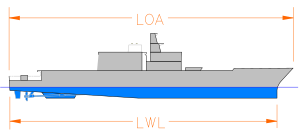Length overall (LOA, o/a, o.a. or oa) is the maximum length of a vessel's hull measured parallel to the waterline. This length is important while docking the ship. It is the most commonly used way of expressing the size of a ship, and is also used for calculating the cost of a marina berth[1] (for example, £2.50 per metre LOA).


LOA is usually measured on the hull alone.[2] For sailing ships, this may exclude the bowsprit and other fittings added to the hull. This is how some racing boats and tall ships use the term LOA.[3] However, other sources may include bowsprits in LOA.[4] Confusingly, LOA has different meanings.[5][6] "Sparred length", "Total length including bowsprit", "Mooring length" and "LOA including bowsprit" are other expressions that might indicate the full length of a sailing ship.
LOD
editOften used to distinguish between the length of a vessel including projections (e.g. bow sprits, etc.) from the length of the hull itself, the Length on Deck or LOD is often reported. This is especially useful for smaller sailing vessels, as their LOA can be significantly different from their LOD.[7][8]
LOH
editIn ISO 8666 for small boats, there is a definition of LOH, or length of hull.[9] This may be shorter than a vessel's LOA, because it excludes other parts attached to the hull, such as bowsprits.
LWL
editAnother measure of length is LWL (loaded waterline length) which is more useful in assessing a vessel's performance. In some cases (particularly old yachts or vessels with bowsprits) LWL can be considerably shorter than LOA.
See also
editReferences
editCitations
edit- ^ "Boat Moorage". Mosquito Creek Marina. Retrieved 2009-07-13.
- ^ "Definitions of: Boat, Yacht, Small Craft, and Related Terms". Westlawn Institute of Marine Technology. Archived from the original on 2010-01-23. Retrieved 2009-07-13.
- ^ "Racing & Sailing Rules and Special Regulations" (PDF). Sail Training International. 2008. p. 2. Archived from the original (PDF) on 2009-09-02.
- ^ Launer, Donald (2006). Dictionary of Nautical Acronyms and Abbreviations. Sheridan House, Inc. p. 64. ISBN 978-1-57409-239-4.
- ^ Schäuffelen, Otmar (2005). Chapman great sailing ships of the world. Hearst Books. p. xix. ISBN 978-1-58816-384-4.
- ^ "Glossary". Wilh. Wilhelmsen ASA. Archived from the original on 2009-05-24. Retrieved 2009-07-18.
- ^ Launer, Donald (2006). Dictionary of Nautical Acronyms and Abbreviations. Sheridan House, Inc. p. 64. ISBN 978-1-57409-239-4.
- ^ "The Dictionary of English Nautical Language". www.seatalk.info. Archived from the original on July 13, 2007. Retrieved 2009-07-13.
{{cite web}}: CS1 maint: unfit URL (link) - ^ "Advanced Sailboat Parameter Calculations & Checks". Product description. Hawaii Marine Templates. Retrieved 2009-07-18.
Sources
edit- Hayler, William B.; Keever, John M. (2003). American Merchant Seaman's Manual. Cornell Maritime Pr. ISBN 0-87033-549-9.
- Turpin, Edward A.; McEwen, William A. (1980). Merchant Marine Officers' Handbook (4th ed.). Centreville, MD: Cornell Maritime Press. ISBN 0-87033-056-X.
